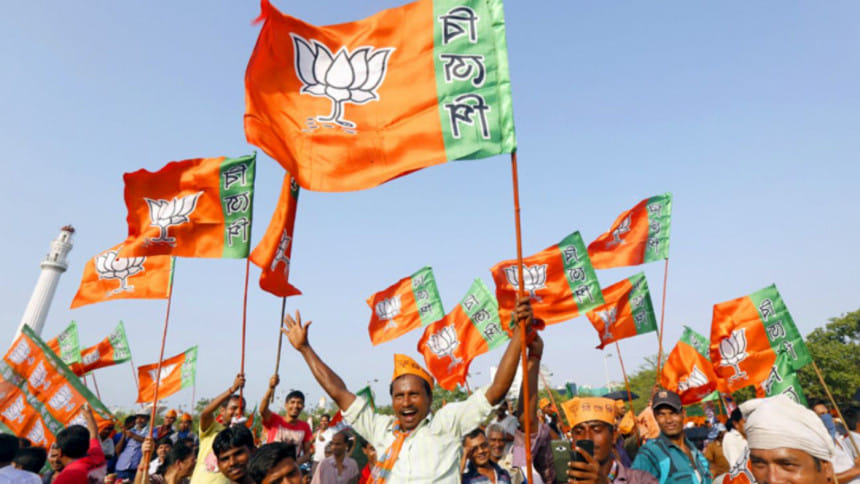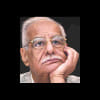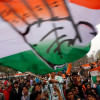Is a federal party possible?

When former Congress President Sonia Gandhi said that they would not allow the Bharatiya Janata Party (BJP) to return to power, she hinted at joint action on the part of the Opposition. It also means that she does not want Prime Minister Narendra Modi to run for a second term. On its own, the Congress does not have the numbers to pose any threat to the BJP-run government or Modi.
In all probability, as things stand today, Modi looks good enough to return to power. The three reverses in recent by-elections to the Lok Sabha and state assemblies notwithstanding, the BJP is capturing power in state after state and spreading its tentacles slowly but surely. Yet, 2019 general elections are some way to go and the impending state election in Karnataka and the subsequent ones in other states later this year would be the real test to assess Modi's strengths and weaknesses.
West Bengal Chief Minister Mamata Banerjee has taken the initiative to get the non-BJP parties together for a federal structure to contest against the BJP in 2019. To underline the Congress cooperation, Mamata has said that she is in touch with Sonia Gandhi daily. In fact, the leaders from other non-BJP ruled states are constantly in touch with each other to see the possibility of a federal structure.
If you recall, the Janata Party was a federal structure. It did not last its course and fell because the then leaders, particularly the top ones like Morarji Desai and Charan Singh, would quarrel in public all the time, much to the exasperation of the people. Then the Jana Sangh wielded power because the opponents were a divided lot. Once the non-Jana Sangh parties came together, the Jana Sangh government was reduced to a minority.
The federal structure that would come up, courtesy of the top leaders like Sonia Gandhi or, for that matter, Mamata Banerjee, has to take a leaf out of the book of the Janata Party and learn to work together. The moot question would be who among the leaders has enough support to be the prime minister. Once this question is settled, things will fall into place and the federal structure could survive.
The question that India faces today is that if pluralism, the nation's ethos, is defeated, which forces would come to power? The BJP seems to want to divide the people. They have been trying for a pro-Hindu government in some shape or the other. The RSS, which is the mentor of the BJP, is playing its role to perfection to help realise the dreams of Modi.
This is where the new federal combination has to be careful. It would be better if they came up with a Minimum Common Programme with all parties endorsing the views and aspirations of all leaders. This is just one important issue which the top leaders of non-BJP have to address as the people's interests should be above everything else.
For the idea of India, which is founded on secularism and democracy, the parties based on religion or castes should have no place in the federal structure. The danger is that various elements would try to pull it in different directions to corner power. Even individual leaders should keep the country's unity ahead of personal or party interests.
If they learn to live together, the warning about their disorder would be repulsed. Secularism would have gone through the fire to prove its intrinsic strength. With coalition politics inevitable in India, the best possible way to defeat the idea of BJP or, for that matter, Modi and his cohorts, is stay together and learn in the process to rule together.
The BJP cannot defeat the ideas of Mahatma Gandhi, unity in diversity. In fact, what it has done is prove Gandhi right. Unity of India could face the danger of separatism. Pakistan, whom I wish well, is the fallout of the mistrust in the Hindu majority. Quaid-e-Azam Muhammad Ali Jinnah, who was an apostle of Hindu-Muslim unity, said that he could not trust the majority, the Hindus. This mistrust is the reason why people left their homes after partition. One million were killed on both sides and Hindus and Muslims went apart further.
The RSS looks like it's copying the idea of division. Its philosophy is nothing and is making a mockery of Gandhi's preaching. The RSS elements did not succeed as the communal forces could not silence Gandhi. They had to ultimately kill him. I had seen the letter which Nathuram Godse wrote in defence of what he did. He avowed respect to Gandhiji but argued that the country would suffer if the Mahatma had lived longer.
I recall one incident from his prayer meetings. I was present when, before the Mahatma started his meeting, one person from Punjab got up and said that he would not listen to the Quran. At the meeting all the three scriptures—the Gita, Quran and Bible—were read. Gandhi said that there would be no meeting until the objector withdrew his dissent. For days, there was no prayer congregation. It was resumed only after the person finally withdrew his objection.
Today, when the fanatic RSS guides the government in appointment of teachers, librarians and heads of academic institutions, there is little hope for merit to take over. Under the circumstances, how can a federal party fight against such elements? The danger to the nation is from those who think that since the country has 80 percent of Hindu population, they have the right to rule.
Leaders like Jawaharlal Nehru and Sardar Patel saw to it that there would be no Hindutva. They converted the then assembly into a constituent assembly to have a constitution. India is ruled today not by the 80 percent but by the constitution which assures one vote to one individual. Even when the Hindus are in a majority, they cannot subvert the idea of India because the constitution is supreme.
Kuldip Nayar is an eminent Indian columnist.










Comments